SWEDISH SOUTH ASIAN STUDIES NETWORK
Thimphu, 28 November
Visit to Department of Adult and Higher Education, Ministry of Education
Web page: http://www.education.gov.bt/DAHE/NFED/NFE.htm
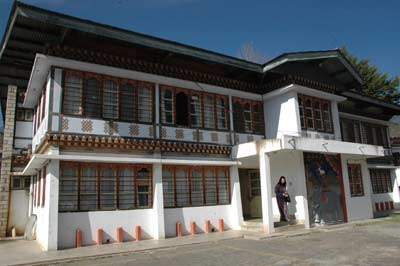
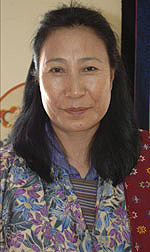 We
met Ms. Nim Dem, Director (photo
to the left). She is in charge of higher education, that is the university
education as well as of adult and informal education.
We
met Ms. Nim Dem, Director (photo
to the left). She is in charge of higher education, that is the university
education as well as of adult and informal education.
We first discussed the school system in Bhutan. It is a 12 year system, divided into primary 1-6, lower secondary 7-8, middle secondary 9-10, and higher secondary 11-12. The medium of instruction is English from the first standard. Buddhism, however, is taught in Dzongkha, the national language.
Ambitious educational system
They have a very ambitious system and today almost all children go to
school, the ratio between boys and girls being about 55/45. But many children
live far away from the schools in rural area and have a very long way
to walk to reach. When rains are heavy, they are often late or miss school
altogether for many days.
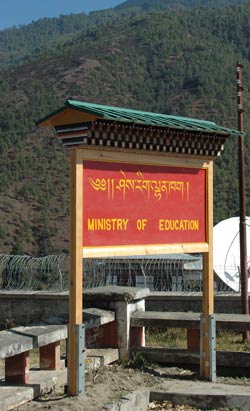 There are 19
private schools which charge a nominal fee and are monitored by the Ministry.
School books are given free to all students.
There are 19
private schools which charge a nominal fee and are monitored by the Ministry.
School books are given free to all students.
At the higher level about 120 students go abroad annually for undergraduate
studies on scholarships from the Bhutanese government. Included in this
figure is a group 50 students who are given complete scholarships by India.
In other cases some part funding is received from some countries and colleges
where the students are studying. We inform about the possibilities for
Master and PhD studies in Sweden.
Frustrated young generation
Many in the current youth generation after the age of 20 are frustrated
with the career opportunities and are unemployed. It is not that there
are no jobs, but their and their parents’ expectations have been
high and the actual jobs offered do not match these. In this group, there
is quite a wide use of drugs. So it represents a serious problem for the
Bhutanese government.
The schools try to provide career counselling in the higher secondary
now. One important aim is to make many students return to agriculture
with their new knowledge in order to introduce scientific farming. But
most young people want to move to the cities.
For those that have not finished school properly, the Department is
setting up classes of continuing education from 2006 onwards. They have
asked the private schools do this and hope that they will respond to this
challenge.
We inform about the Swedish Folk High School System and Ms. Nim Dem said
that it would perhaps be interesting to study that and get some advice
about continuing education in Sweden. We promised to host such a visit
with contacts, etc.
Visit to Royal Civil Service Commission, Bhutan
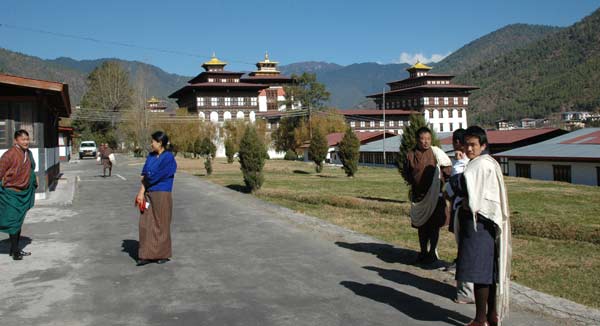 Web
page: http://www.rcsc.gov.bt/
Web
page: http://www.rcsc.gov.bt/
We met Mr. Bap Kesang, who
is the Secretary. The Commission is organising the government administration
in the country. He gave a long introduction to modern Bhutan and its development
during the past 40 years. It is very important that Bhutan is understood
in its proper perspective, he claims.
His Majesty’s policies have been enlightened when thinking about
the difficult times that Bhutan was facing a generation back. People were
illiterate and there were no resources to develop the country. They had
to import everything, skilled people and goods. Bhutan has received a
lot of aid for this, both bilateral and multilateral.
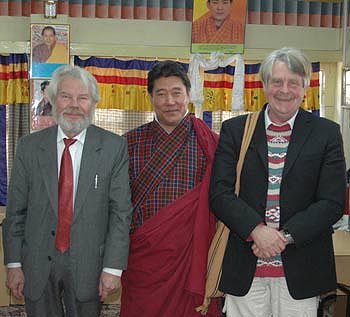 |
| Mr Bap Kesang flanked by Prof. Staffan Lindberg and Mr. Lars Eklund, SASNET. |
Bhutan became member of the United Nations in 1972, and at that time
the government stated that there were 1 million people in the country
to avoid being treated as a very small country. The official UN figure
for the population today is therefore 2.4 million. The real figure is
thought to be only 750 000. A Census has just been held and the result
is expected soon.
Development has been rapid since then. Now Bhutan adopts modern technology
in al spheres and has a great many highly educated citizens, both men
and women.
The Bureaucracy is now being reformed from a cadre based to position classification based system. The Royal Institute of Management at the University is in charge of training the new officers. They offer masters programme in financial management, policy and public administration. Continuing education of government servants will also be provided. They are affiliated to the National Institute of Financial Management in India, but are also looking for other foreign collaboration.
Mr. Bap Kesang has formerly been Bhutan’s ambassador in Geneva, which looks after diplomatic relations with Sweden. He has many Swedish friends through the active Swedish-Bhutan Society (Svensk-Bhutanesiska Föreningen), and he also knows of a few Bhutanese people married to Swedes.
SASNET - Swedish South Asian Studies Network/Lund
University
Address: Scheelevägen 15 D, SE-223 70 Lund, Sweden
Phone: +46 46 222 73 40
Webmaster: Lars Eklund
Last updated
2010-02-17
